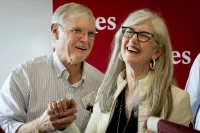
On the first day of Short Term, Eugene Kim ’08 asked his students to come up with an example of a time they marketed something.
Mamta Saraogi ’21 of Kolkata, India, thought of a time she tried to get her classmates to try meditation, an important part of her own life. She’d explained its benefits, with the goal of helping her friends experience those benefits themselves.
“It placed a hobby that I had in the context of something that I can spread to people in a strategic way, to have an impact rather than confine it to my own personal hobby,” she said.
If you think about it, marketing is part of everyday life, just as it is central to any business, organization, or movement. Done right, it has the potential to do tremendous good, Kim says.
That’s why he’s teaching “Marketing with Higher Purpose for the Conscious Human,” one of five practitioner-taught courses offered this Short Term through the Center for Purposeful Work.

Mamta Saraogi ’21 watches a presentation by representatives of athletic clothing company lululemon. An English major, Saraogi said Eugene Kim’s course has expanded her understanding of the good marketing can do. (Phyllis Graber Jensen/Bates College)
Kim is teaching his students about purpose-driven marketing, an increasingly popular approach that sees marketing not only as driving profits, but as improving communities and the lives of customers.
The class, Kim hopes, will help students “understand that type of human behavior, that decision-making process, and then how a purpose-driven, socially conscious brand can align with someone at that level to help build more advocacy and connect better with their community.”
It took Kim awhile to find his purpose in purpose-driven marketing. A double major in biology and art and visual culture at Bates, he made plans to go to medical school until, one day during his junior year, he realized he’d forgotten why he wanted to be a doctor in the first place.
Casting about for careers that might fit his art and science background, Kim interned for local firm Rinck Advertising and discovered an interest in marketing.
He worked as an account executive and strategist in Boston for several years, but found himself increasingly disillusioned.
Eugene Kim ’08 watches representatives of athletic clothing company lululemon talk about the company’s marketing. (Phyllis Graber Jensen/Bates College)
“Often you work with brands or companies or clients who don’t have the world’s best interests in mind,” he said.
After six years, Kim formed his own freelance marketing business. He helps clients understand the purpose of their businesses and develop marketing plans; with one company, which makes fermented foods, he’s become a business partner.
Patagonia, a go-to example of a purpose-driven brand, has taken strong stances on political issues and even directly criticized the Trump administration for its environmental policies. But purpose-driven marketing doesn’t necessarily mean taking up a cause. Another of Kim’s clients, an aesthetic doctor, simply understands that cosmetics are only one way to feel good about yourself.
Whatever the purpose, the company has to walk the walk. “That purpose needs to permeate their company culture,” Kim says. “Everyone who’s on board needs to be aligned with where they’re headed, and that needs to reflect in the way they do business.”
“A company or brand can talk about how they support sustainability all day, but at the end of the day, if their business practices don’t align with that, eventually they’re not going to have staying power.”
The Short Term class is discussion-based, with frequent guest speakers from brands like The North Face and lululemon.
Chris Capozzi and Amie Zimon of lululemon present to Eugene Kim’s marketing class. (Phyllis Graber Jensen/Bates College)
And, true to the practitioner-taught course model, students are practicing what they’re learning. They’re creating a model marketing strategy for the Office of Campus Life, the part of Student Affairs responsible for clubs, student initiatives, and events.
They’ll catalog the office’s activities and recommend ways to crack one of any college’s toughest nuts: communicating with students, especially as the office rolls out a new app for events.
On May 3, Associate Dean of Students for Campus Life Kim Trauceniek and Coordinator of Campus Life Programming Jen Haugen visited the class in Pettigrew Hall. The students in the class had spoken with Trauceniek the previous day and emailed follow-up questions to Kim, who read them out loud.
The questions were wide-ranging: How does the app work? How does the office solicit student input? How does the office define campus culture? Underlying their questions, though, was an understanding that the needs of Bates students are central to Campus Life’s programming and to its marketing.
Trauceniek told the students that she was grateful for the opportunity to reflect on Campus Life’s purpose and how it communicates its activities.
David Akinyemi ’21 said the course, so far, has helped him see that people respond to purpose.
David Akinyemi ’21 asks a question of of representatives of lululemon on May 9. A physics major, Akinyemi took Eugene Kim’s class in order to learn about marketing in anticipation of a career in tech. (Phyllis Graber Jensen/Bates College)
“People don’t fall in love with what you do; they fall in love with why you do it,” he said. “It’s all about your motive.
“Even if they don’t fully connect with your purpose, they’ll understand that you’re passionate about something, and it’ll draw them more to what you’re trying to get them to do.”

